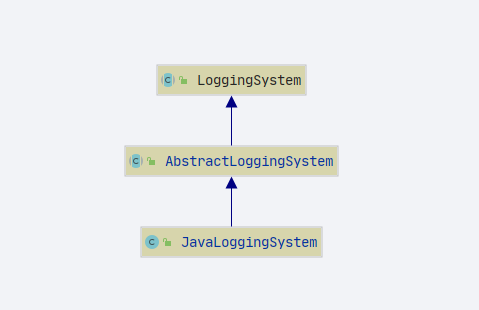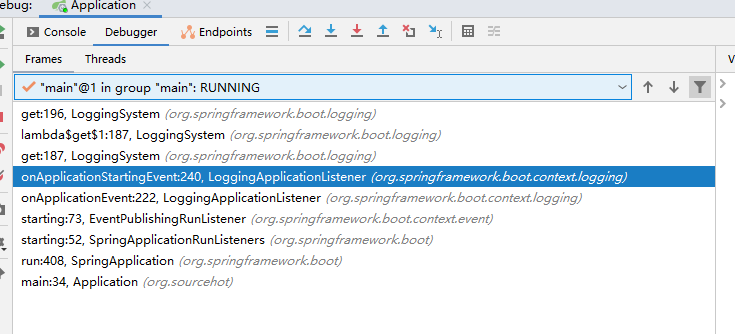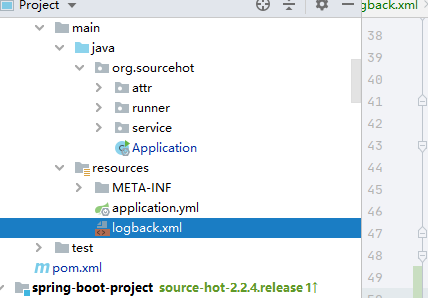SpringBoot-LogSystem
SpringBoot 日志系统
-
Author: HuiFer
-
源码阅读仓库: SourceHot-spring-boot
-
包路径:
org.springframework.boot.logging
日志级别
-
日志级别:
org.springframework.boot.logging.LogLevel1 2 3public enum LogLevel { TRACE, DEBUG, INFO, WARN, ERROR, FATAL, OFF }
Java 日志实现
-
org.springframework.boot.logging.java.JavaLoggingSystem
1 2 3 4 5 6 7 8 9 10static { // KEY : springBoot 定义的日志级别, value: jdk 定义的日志级别 LEVELS.map(LogLevel.TRACE, Level.FINEST); LEVELS.map(LogLevel.DEBUG, Level.FINE); LEVELS.map(LogLevel.INFO, Level.INFO); LEVELS.map(LogLevel.WARN, Level.WARNING); LEVELS.map(LogLevel.ERROR, Level.SEVERE); LEVELS.map(LogLevel.FATAL, Level.SEVERE); LEVELS.map(LogLevel.OFF, Level.OFF); } -
LEVELS 对象
1 2 3 4 5 6 7 8 9 10protected static class LogLevels<T> { /** * key : SpringBoot 中定义的日志级别, value: 其他日志框架的日志级别 */ private final Map<LogLevel, T> systemToNative; /** * key : 其他日志框架的日志级别 , value: springBoot 中定义中定义的日志级别 */ private final Map<T, LogLevel> nativeToSystem; }
LoggingSystem
-
抽象类
-
org.springframework.boot.logging.LoggingSystem -
一个 map 对象:
SYSTEMS1 2 3 4 5 6 7 8 9 10 11 12 13/** * key: 第三方日志框架的类 value: springBoot 中的处理类 */ private static final Map<String, String> SYSTEMS; static { Map<String, String> systems = new LinkedHashMap<>(); systems.put("ch.qos.logback.core.Appender", "org.springframework.boot.logging.logback.LogbackLoggingSystem"); systems.put("org.apache.logging.log4j.core.impl.Log4jContextFactory", "org.springframework.boot.logging.log4j2.Log4J2LoggingSystem"); systems.put("java.util.logging.LogManager", "org.springframework.boot.logging.java.JavaLoggingSystem"); SYSTEMS = Collections.unmodifiableMap(systems); } -
各个抽象方法
方法名称 作用 beforeInitialize 初始化之前调用,目的是减少日志输出 initialize 初始化日志 cleanUp 清除日志 getShutdownHandler getSupportedLogLevels 获取支持的日志级别 setLogLevel 设置日志级别 getLoggerConfigurations 获取日志配置
get
|
|
- 实例化日志系统
|
|

- 默认日志:
org.springframework.boot.logging.logback.LogbackLoggingSystem
beforeInitialize
-
初始化之前

-
链路
org.springframework.boot.context.logging.LoggingApplicationListener#onApplicationEventorg.springframework.boot.context.logging.LoggingApplicationListener#onApplicationStartingEventorg.springframework.boot.logging.LoggingSystem#beforeInitialize
-
因为前文中我们已知对象是:
org.springframework.boot.logging.logback.LogbackLoggingSystem直接看这个类的beforeInitialize方法1 2 3 4 5 6 7 8 9 10 11 12 13@Override public void beforeInitialize() { // 日志上下文 LoggerContext loggerContext = getLoggerContext(); // 是否初始化 if (isAlreadyInitialized(loggerContext)) { return; } // 父类方法 super.beforeInitialize(); // 添加过滤器 loggerContext.getTurboFilterList().add(FILTER); } -
初始化之前的的操作完成了初始化方法开始
initialize
-
org.springframework.boot.context.logging.LoggingApplicationListener#onApplicationEnvironmentPreparedEvent1 2 3 4 5 6private void onApplicationEnvironmentPreparedEvent(ApplicationEnvironmentPreparedEvent event) { if (this.loggingSystem == null) { this.loggingSystem = LoggingSystem.get(event.getSpringApplication().getClassLoader()); } initialize(event.getEnvironment(), event.getSpringApplication().getClassLoader()); } -
org.springframework.boot.context.logging.LoggingApplicationListener#initializeSystem1 2 3 4 5 6 7 8 9 10 11 12 13 14 15protected void initialize(ConfigurableEnvironment environment, ClassLoader classLoader) { new LoggingSystemProperties(environment).apply(); this.logFile = LogFile.get(environment); if (this.logFile != null) { this.logFile.applyToSystemProperties(); } this.loggerGroups = new LoggerGroups(DEFAULT_GROUP_LOGGERS); // 早期 的日志级别 initializeEarlyLoggingLevel(environment); // 初始化日志系统 initializeSystem(environment, this.loggingSystem, this.logFile); // 初始化日志级别 initializeFinalLoggingLevels(environment, this.loggingSystem); registerShutdownHookIfNecessary(environment, this.loggingSystem); }1 2 3 4 5 6 7 8 9 10 11 12 13 14 15 16 17 18 19 20private void initializeSystem(ConfigurableEnvironment environment, LoggingSystem system, LogFile logFile) { LoggingInitializationContext initializationContext = new LoggingInitializationContext(environment); String logConfig = environment.getProperty(CONFIG_PROPERTY); if (ignoreLogConfig(logConfig)) { // 日志系统初始化 system.initialize(initializationContext, null, logFile); } else { try { ResourceUtils.getURL(logConfig).openStream().close(); system.initialize(initializationContext, logConfig, logFile); } catch (Exception ex) { // NOTE: We can't use the logger here to report the problem System.err.println("Logging system failed to initialize using configuration from '" + logConfig + "'"); ex.printStackTrace(System.err); throw new IllegalStateException(ex); } } } -
org.springframework.boot.logging.logback.LogbackLoggingSystem#initialize1 2 3 4 5 6 7 8 9 10 11 12 13 14 15@Override public void initialize(LoggingInitializationContext initializationContext, String configLocation, LogFile logFile) { LoggerContext loggerContext = getLoggerContext(); if (isAlreadyInitialized(loggerContext)) { return; } // 日志初始化 super.initialize(initializationContext, configLocation, logFile); loggerContext.getTurboFilterList().remove(FILTER); markAsInitialized(loggerContext); if (StringUtils.hasText(System.getProperty(CONFIGURATION_FILE_PROPERTY))) { getLogger(LogbackLoggingSystem.class.getName()).warn("Ignoring '" + CONFIGURATION_FILE_PROPERTY + "' system property. Please use 'logging.config' instead."); } } -
org.springframework.boot.logging.AbstractLoggingSystem#initializeWithConventions1 2 3 4 5 6 7 8 9 10 11 12 13 14 15 16 17private void initializeWithConventions(LoggingInitializationContext initializationContext, LogFile logFile) { String config = getSelfInitializationConfig(); if (config != null && logFile == null) { // self initialization has occurred, reinitialize in case of property changes reinitialize(initializationContext); return; } if (config == null) { config = getSpringInitializationConfig(); } if (config != null) { loadConfiguration(initializationContext, config, logFile); return; } // 加载默认配置 loadDefaults(initializationContext, logFile); } -
org.springframework.boot.logging.logback.LogbackLoggingSystem#loadDefaults1 2 3 4 5 6 7 8 9 10 11 12 13 14 15 16 17 18 19 20@Override protected void loadDefaults(LoggingInitializationContext initializationContext, LogFile logFile) { LoggerContext context = getLoggerContext(); stopAndReset(context); boolean debug = Boolean.getBoolean("logback.debug"); if (debug) { StatusListenerConfigHelper.addOnConsoleListenerInstance(context, new OnConsoleStatusListener()); } LogbackConfigurator configurator = debug ? new DebugLogbackConfigurator(context) : new LogbackConfigurator(context); Environment environment = initializationContext.getEnvironment(); context.putProperty(LoggingSystemProperties.LOG_LEVEL_PATTERN, environment.resolvePlaceholders("${logging.pattern.level:${LOG_LEVEL_PATTERN:%5p}}")); context.putProperty(LoggingSystemProperties.LOG_DATEFORMAT_PATTERN, environment.resolvePlaceholders( "${logging.pattern.dateformat:${LOG_DATEFORMAT_PATTERN:yyyy-MM-dd HH:mm:ss.SSS}}")); context.putProperty(LoggingSystemProperties.ROLLING_FILE_NAME_PATTERN, environment .resolvePlaceholders("${logging.pattern.rolling-file-name:${LOG_FILE}.%d{yyyy-MM-dd}.%i.gz}")); new DefaultLogbackConfiguration(initializationContext, logFile).apply(configurator); context.setPackagingDataEnabled(true); }1 2 3 4 5 6 7 8 9 10 11 12 13 14 15 16 17 18@Override public void initialize(LoggingInitializationContext initializationContext, String configLocation, LogFile logFile) { LoggerContext loggerContext = getLoggerContext(); // 是否加载过 if (isAlreadyInitialized(loggerContext)) { return; } // 日志初始化 super.initialize(initializationContext, configLocation, logFile); // 删除 FILTER loggerContext.getTurboFilterList().remove(FILTER); // 初始化标记 markAsInitialized(loggerContext); if (StringUtils.hasText(System.getProperty(CONFIGURATION_FILE_PROPERTY))) { getLogger(LogbackLoggingSystem.class.getName()).warn("Ignoring '" + CONFIGURATION_FILE_PROPERTY + "' system property. Please use 'logging.config' instead."); } } -
标记
markAsInitialized1 2 3private void markAsInitialized(LoggerContext loggerContext) { loggerContext.putObject(LoggingSystem.class.getName(), new Object()); }
此时日志初始化完成。
默认配置文件
-
getStandardConfigLocations这个方法定义了默认配置文件有哪些。1 2 3 4@Override protected String[] getStandardConfigLocations() { return new String[] { "logback-test.groovy", "logback-test.xml", "logback.groovy", "logback.xml" }; } -
切回
org.springframework.boot.logging.AbstractLoggingSystem#initializeWithConventions方法 -
添加依赖
1 2 3 4 5<dependency> <groupId>org.springframework.boot</groupId> <artifactId>spring-boot-starter-logging</artifactId> <version>${revision}</version> </dependency> -
添加配置文件


-
此时配置文件地址出现了
1 2 3 4protected String getSelfInitializationConfig() { // 寻找配置文件 return findConfig(getStandardConfigLocations()); }1 2 3 4@Override protected String[] getStandardConfigLocations() { return new String[] { "logback-test.groovy", "logback-test.xml", "logback.groovy", "logback.xml" }; }1 2 3 4 5 6 7 8 9private String findConfig(String[] locations) { for (String location : locations) { ClassPathResource resource = new ClassPathResource(location, this.classLoader); if (resource.exists()) { return "classpath:" + location; } } return null; } -
此时自定义配置文件如何获取的已经明了。
reinitialize
|
|
|
|
|
|
执行配置属于 logback 操作源码不在此进行分析。
- 原文作者:知识铺
- 原文链接:https://geek.zshipu.com/post/code/docs/SpringBoot/SpringBoot-LogSystem/
- 版权声明:本作品采用知识共享署名-非商业性使用-禁止演绎 4.0 国际许可协议进行许可,非商业转载请注明出处(作者,原文链接),商业转载请联系作者获得授权。
- 免责声明:本页面内容均来源于站内编辑发布,部分信息来源互联网,并不意味着本站赞同其观点或者证实其内容的真实性,如涉及版权等问题,请立即联系客服进行更改或删除,保证您的合法权益。转载请注明来源,欢迎对文章中的引用来源进行考证,欢迎指出任何有错误或不够清晰的表达。也可以邮件至 sblig@126.com


